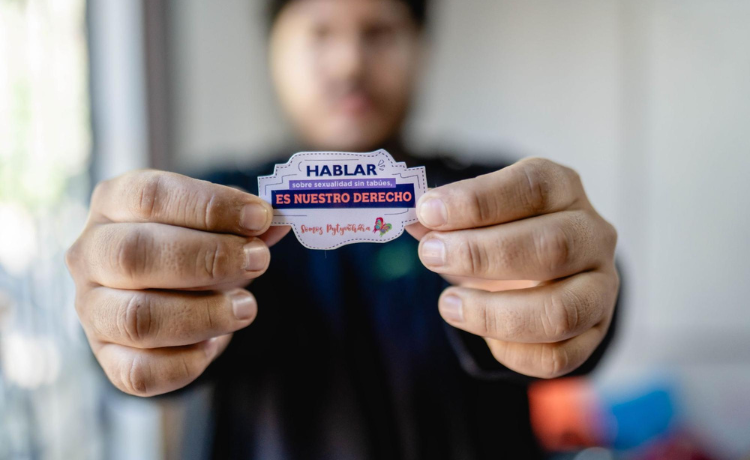News
Peer-to-peer information is power: The hotline equipping young people in Paraguay to exert their rights
- 12 August 2024
News
ASUNCIÓN, Paraguay – Hardly a day goes by when the phone doesn’t ring: Young people call and write to Paraguay’s peer-to-peer, comprehensive sexuality education hotline constantly to ask about menstruation, sexually transmitted infections, contraceptives and other issues.
Juan*, one of the hotline’s trained operators, remembers wondering about similar subjects when he was a teenager. “But now, I can answer those questions and make it easier for adolescents to exercise their rights,” the 21-year-old told UNFPA, the United Nations sexual and reproductive health agency.
The EIS De Par a Par hotline launched in 2020 as a safe space for young people to talk through often-taboo topics related to sex and sexuality. Since then, hundreds have called and messaged to receive free, factual and non-judgmental guidance from trained peer counsellors like Juan.
"Young people feel that they can freely express themselves and share their concerns with us,” he said. “This is reflected every day when they contact the line, even outside of business hours.”
Technology with a human touch
With stigma preventing open discussions of sexual and reproductive health, it can be difficult for young people to access the information they need to protect themselves, exert their rights and navigate change during adolescence.
Yet digital innovations like EIS De Par a Par have put the answers to urgent questions in the palm of teens’ hands. Research suggests more than nine in ten Paraguayans are smartphone users, while data from 2011 put children’s mobile phone ownership rate at 78 per cent.
Access to such information can be life-changing, especially for young women and girls across the country, and disproportionately, the poorest among them. In 2021, 70 of every 1,000 adolescent girls aged 15 to 19 had a baby; nearly 10 per cent of deaths that occurred among this age group were related to pregnancy and childbirth. Preventing pregnancies, therefore, can save lives.
“Every girl is born with boundless potential. Yet child marriage, adolescent pregnancy and gender-based violence derail the lives of far too many,” UNFPA Executive Director Dr. Natalia Kanem has said. “We must act more boldly so that every girl, wherever she is, grows up safe in the knowledge that her body is her own and her future is hers to chart.”

Powerful conversations between peers
More than 20 young people make up the Somos Pytyvõhára organization, which runs the EIS De Par a Par hotline. In the Guaraní language, Pytyvõhára means “the one who helps”.
Juan and 19-year-old counsellor Leila* embody the spirit of the group’s name. Besides answering calls and messages from their peers, they also visit nearby hospitals to gather information on and confirm the schedules of adolescent-friendly health services.
Members of Somos Pytyvõhára also participate in events to raise awareness of sexual and reproductive health issues and advocate against rights violations like gender-based violence. More than three in five Paraguayan women over the age of 18 reported being forced to confront sexual violence in their lifetime, according to a 2021 survey.
“The goal is for adolescents to feel comfortable and free to express their concerns to us, without fear of being judged,” Leila said of her work. "I firmly believe that by providing information, we can prevent situations of vulnerability and violence.”
* Names have been changed for privacy and protection